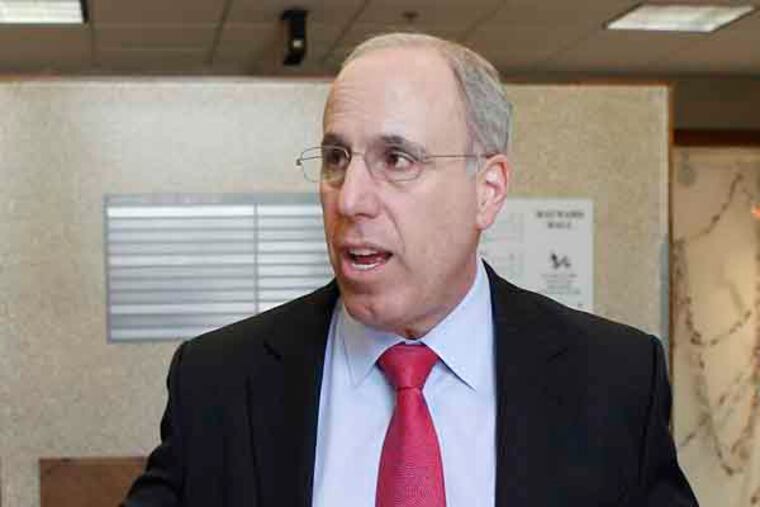Phila. University president 'always selling' inspiration
His Twitter handle is @SpinelliS. His blog address: http://wordpress.philau.edu/president. There, and on Facebook too, Stephen Spinelli Jr. has sounded off on such topics as the ill-advised but brief decision by Maker's Mark to water down its bourbon, the end of Yahoo's work-from-home practices, the parallels between preventive car care and employers' needs, and so much more.

His Twitter handle is @SpinelliS. His blog address: http://wordpress.philau.edu/president. There, and on Facebook too, Stephen Spinelli Jr. has sounded off on such topics as the ill-advised but brief decision by Maker's Mark to water down its bourbon, the end of Yahoo's work-from-home practices, the parallels between preventive car care and employers' needs, and so much more.
Through the electronic chatter, Spinelli, president of Philadelphia University and a cofounder of Jiffy Lube, is trying to inspire on his 3,500-student campus development of more of what he is to his core: a hopelessly addicted entrepreneur.
In the process, the "always selling" Spinelli is engagingly disseminating the message that the university's new architectural marvel of glass and reconfigurable floor space known as the DEC Center (for Design, Engineering and Commerce) is just one manifestation of a broader commitment to a project-based and problem-solving curriculum that made its debut in 2011.
At the school's helm since September 2007, Spinelli, 58,
took a seat in the DEC Center last week to explain his embracing of social media and his view of entrepreneurship.
Q: What do you see your role as here in fostering an entrepreneurial viewpoint?
A: I'm a bit of a fanatic. I believe that entrepreneurship and innovation are cultural core competencies. Historically, [they] have been ad hoc in nature and a bit Darwinian in process. We've had as a nation some success with that, but when one looks at the intersection of education and the role of education in building a society, and you see the capabilities of higher education, you say, "Why aren't they better aligned?"
Q: Why did you decide social media needed to be part of your role here?
A: If you're going to teach about being current and a little bit foresightful, you better engage that process. The tools for communication today are so robust that I need to hear and I need to voice what we're doing in a robust way. And it's fun.
Q: Do students come to you and ask you for advice?
A: All the time. Once a week, I talk to a kid about what is the vehicle to bring their idea to market. And I get overwhelmed with e-mails and calls.
Q: Do you answer all of them?
A: Oh, absolutely. The answer may be: "I think it's awful. Please reconsider." I usually answer with more questions: Who is your market? Do you understand how your market defines value? Do you understand how large your market is? Do you understand where your market is currently spending money? Do you understand what the margins are? My job is not to judge; my job is to support.
Q: As a president, where do you want to make your biggest mark? Having inspired students to become entrepreneurs?
A: I want to inspire them to become value creators. I want them to see the world in terms of their responsibility to create value for the largest set of stakeholders that they're capable of impacting. That includes themselves, by the way. That's why we ask the question: "Desirable, feasible, valuable for whom?" If they can answer those questions, oh my gosh, your opportunities over life are just limitless. I want that to be embedded in this culture.
Q: We heard a lot during the economic downturn that small-business owners/entrepreneurs are the backbone of the economy. Do you think we are now at a point that it's a time for entrepreneurs like never before?
A: We're still at very low levels of growth, and we need more entrepreneurial behavior. I think the capital marketplace is still stuck and is not as fluid as it could or should be. But I believe that the latent desire to be entrepreneurial has not receded and may have even accelerated.
Q: That's an easy argument to make in a week when some 26-year-old got $1.1 billion for Tumblr.
A: Yeah. And I love those examples because they inspire. But most people won't do that. But there are a lot of our students that will make $1.2 million. And I love those because it keeps people stretching and wanting to do more, but it's the businesses that grow up and do 20 or 25 or 30 million. . . . They influence the larger companies to be better at what they do because there's someone nipping at their heels. I don't like the too-big-to-fail thing.
Q: Of all the deals out there, which one has surprised you the most?
A: The process of buying customer attention is really intriguing to me. If you look at Tumblr, their revenue was not eye-popping, to say the least. But they had a robust following, and how that robust following will add value is a really interesting statement of the complexity of the entrepreneurial ecosystem.
Q: Is this going to be a curriculum that you see people really looking for? Are kids coming to college saying, "I'm going to be an entrepreneur"?
A: I think we're getting there. Thinking of entrepreneurship and innovation as a career vs. an activity is a different mind-set. When we start to formalize that thinking, then it has cultural impacts of saying: "That's a career. I'm not off on a lark." Entrepreneurs who are larky, if that's a word, do not inspire me. I want committed people who believe in what they're doing.